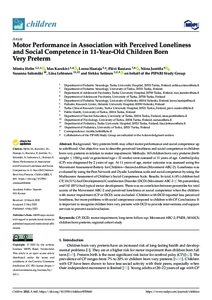Motor Performance in Association with Perceived Loneliness and Social Competence in 11-Year-Old Children Born Very Preterm
Helin Minttu; Karukivi Max; Haataja Leena; Rautava Päivi; Junttila Niina; Salomäki Susanna; Lehtonen Liisa; Setänen Sirkku; PIPARI Study Group
https://urn.fi/URN:NBN:fi-fe2022081154728
Tiivistelmä
Background: Very preterm birth may affect motor performance and social competence up to adulthood. Our objective was to describe perceived loneliness and social competence in children born very preterm in relation to motor impairment.
Methods: 165 children born very preterm (birth weight ≤ 1500 g and/or gestational age < 32 weeks) were assessed at 11 years of age. Cerebral palsy (CP) was diagnosed by 2 years of age. At 11 years of age, motor outcome was assessed using the Movement Assessment Battery for Children-Second edition (Movement ABC-2). Loneliness was evaluated by using the Peer Network and Dyadic Loneliness scale and social competence by using the Multisource Assessment of Children's Social Competence Scale.
Results: In total, 6 (4%) children had CP, 18 (11%) had Developmental Coordination Disorder (DCD) (Movement ABC-2 ≤ 5th percentiles), and 141 (85%) had typical motor development. There was no correlation between percentiles for total scores of the Movement ABC-2 and perceived loneliness or social competence when the children with motor impairment (CP or DCD) were excluded. Children with DCD reported less perceived loneliness, but more problems with social competence compared to children with CP.
Conclusions: It is important to recognize children born very preterm with DCD to provide interventions and support services to prevent social exclusion.
Kokoelmat
- Rinnakkaistallenteet [27094]
